Brian Murphy's Blog, page 31
February 17, 2022
War of the Gods!
If you want the TL;DR version of the linked article, Poul Anderson is a damned good writer who channeled the Northern Thing in a way very few authors can.
February 12, 2022
Seventeen+year journey to a new career: Six takeaways
It’s been a hell of a last few weeks, starting from accepting the offer on Thursday, Jan. 20, telling my boss and my colleagues on Friday Jan. 21st, then releasing the news to the broader healthcare community which I serve this past Thursday. Since then, messages of well-wishing and support (mixed with some of surprise and disbelief, and sadness), have been pouring in non-stop. It’s left me feeling exhausted, but also incredibly grateful, with a great sense of anticipation for this next chapter in my professional life. I’ll be working from home, permanently, as this new company—small and nimble—does not have a brick-and-mortar presence. I can’t wait.
What did I learn over the last 17 ½ years, and in particular this latest momentous turn in my career? What would I recommend to others looking to further their own career? Here’s my advice.
1. Get comfortable with discomfort. As someone who suffers from mild social anxiety, and has struggled with bouts of inferiority, imposter syndrome etc., giving opening conference addresses in front of crowds as large as 1,800 people, and leading teams through tough times, has not been easy, and resulted in considerable levels of personal discomfort. Playing football and lifting heavy weights has allowed me to work through pain, but never inured me to it. Discomfort will never goes away. You have two choices when it confronts you—retreat, or press on. I choose the latter almost every time, and that has made a difference. Like tearing muscle fibers during a workout, and then allowing them to repair themselves and get stronger, you grow professionally in zones of discomfort. A hard lesson, but true.
2. Success mainly is a result of hard work. I don’t disregard luck, or privilege, but mainly, persistence and discipline make the difference, even more than talent. I have no special level of intelligence, or rare skill, but I do stick to things after others give up. I have a good attention span. I also communicate well. But most of all I’m a fairly disciplined individual. I like keeping busy and doing good work. I don’t kill myself with marathon days, and I have family life that I give much of my time to, but I don’t slack off, either. Stack several good days of work on top of each other, and you will have something good to show for it. Stack several good years together, and you’ve got a career and a resume that will make you stand out. There really aren’t shortcuts to this process.
3. Don’t blame others for your failures. One of the best books I’ve read in the last five years is ex-Navy Seal Jocko Willink’s Extreme Ownership. He describes a rule for self-conduct that is both incredibly simple, but very hard to rigorously follow—taking responsibility for everything in your life. Yeah, shit happens along the way, but we can choose how we react to it. We can choose to use failure as an opportunity to get better. If you experience failure, start not by looking for someone to blame, but asking yourself: What could I have done better? What will I do better next time? If you are a leader and someone on your team comes up short, instead of pointing the finger, recognize that it’s your responsibility to train that person better, and equip them with the tools they need to succeed. Victim mentality is a terrible mindset to adopt.
4. Kindness goes a long way. Treat people—especially your direct reports—as you would want to be treated. More than ever these days, there is no bossing people around (there never really was, unless we’re talking medieval lords/vassals relationship). In these days of labor shortages and “the great resignation,” employees more than ever hold the upper hand. Your colleagues will respond to being treated fairly, and with kindness, and will reciprocate with loyalty. You will find yourself surrounded by people willing to work hard and make you look better, because they care for you.
5. Networks are a thing, so cultivate them. Talk to people. Help them in their careers—invite them on a podcast if you have one, allow them to speak at your event, write articles about them, respond to their emails, link in on LinkedIn. Inevitably they will return the favor. This creates a network effect, where knowing a lot of people gives you acceptance, even authority, in your field. Congratulate others on their successes. Treat your competition as people, because that’s what they are, and all they are. Do this, and you will find doors open when you did not know they even existed.
6. Dip your toe in the water before taking the plunge. Putting in a few extra hours of work, after hours, is not easy, and will cut into your Netflix time, but it allows you to try the thing before you commit to it. In my case I started freelancing for this new company on my personal time, and they liked what I had to offer, which led to a conversation about coming on board full time. In short, see bullet point 2.
February 5, 2022
Richard Tierney, 1936-2022
Tierney was, as the article states, one of a thin line carrying on the sword-and-sorcery tradition with good new material in the 1970s, alongside the likes of Karl Edward Wagner and Charles Saunders. I very much enjoyed his Simon of Gitta stories, as found in the classic Swords Against Darkness anthologies, his pastiche work/posthumous REH collaborations in Tigers of the Sea, and his Red Sonja collaborations with David C. Smith. He was also highly regarded as a poet, and that bit of verse published on DMR confirms his skill.
It's sad to see these old S&S veterans go. But when you keep reading them, you keep the flame burning.
February 3, 2022
The Harp and the Blade, a review
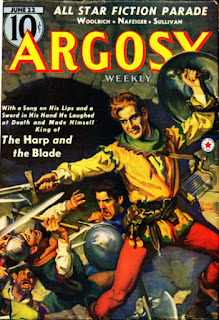 At 10 cents you get your money's worthSomeone recently asked me, Can sword-and-sorcery be written successfully at novel length? My answer was, of course: See Karl Edward Wagner’s Bloodstone, or Fritz Leiber’s The Swords of Lankhmar.
At 10 cents you get your money's worthSomeone recently asked me, Can sword-and-sorcery be written successfully at novel length? My answer was, of course: See Karl Edward Wagner’s Bloodstone, or Fritz Leiber’s The Swords of Lankhmar.
But, after reading John Myers Myers’ The Harp and the Blade, I would now tell aspiring authors: Here’s a pretty solid template.
This book moves. The Harp and the Blade was originally published as a seven-part serial in the venerable magazine Argosy in 1940, and in paperback still bears some hallmarks of its pulp heritage. It needed to be swift, and grab readers from issue to issue. Each chapter is just 10 pages, and the entirety of the book is a mere 230 pages. No needless descriptions. No navel-gazing “world building” (it is set 10th century Dark Ages France, on the cusp of the feudal era, so not a whole lot of that is needed). More to the point: Something important happens each chapter to advance the plot.
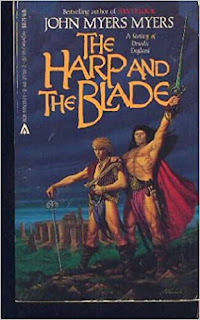 S&S beefcake... 1985 style.
S&S beefcake... 1985 style.Now, is The Harp and the Blade sword-and-sorcery? Maybe, but probably not. It’s best classified as historical fiction. Although you could be forgiven for thinking it was S&S, so closely does it skirt that territory. Certainly it’s packaged that way. I have the 1985 edition as published by Ace. Look at that cover! Two overmuscled dudes, one a hip bard with 80s surfer hair, the other a classic Boris Vallejo style barbarian. This was definitely marketed to the same audience that devoured the Lancer Conans in the 60s and the DAW Elrics in the 70s. Publishers of the era were going to great lengths to ride the sword-and-sorcery wave, although by the mid-80s the subgenre was about to disappear from the shelves, almost overnight, with few exceptions (Keith Taylor’s Bard novels, for example). Morgan Holmes calls this “The great sword-and-sorcery extinction event.”
Oh, and the “barbarian’s” name happens to be… Conan! Not the Conan you’re thinking of, and in fact other than being a resourceful, charismatic leader with some skill with a blade, bears no resemblance to Robert E. Howard’s most famous creation. The name Conan has historical Gaelic/Celtic roots, although one might assume Myers Myers was at least familiar with Howard’s work.
Packaging alone is not enough, but what edges this book back into S&S territory is the geas our hero, the bard Finnian, is placed under. This is skillfully handled by Myers Myers, and it may just be shame, or the power of persuasion, that causes our hero to begin to take responsibility. After callously watching a man get murdered in a tavern brawl when he may have intervened and saved a life, Finnian is shamed (and possibly, ensorcelled) by a druid in a wonderful scene atop a cromlech on a moonlit night. Thereafter his life is changed; he begins to accept responsibility, and act out of a sense of altruism.
This is the heart of the book, and the message that lies beneath the page-turning action. Finnian is, like many of the classic heroes of S&S, an outsider. He is literally that—an Irish bard in foreign lands, making his living with his songs and his poetry, never settling down but moving from modest payday to payday. Just living, untrammeled. Lacking any commitments, he has nothing to tie him down, but seemingly nothing to give his life meaning, either. He’s at a crossroads.
Make no mistake, this is THE struggle all men face. Do we drift through life, viewing others’ misfortunes as not our own (“not my circus, not my monkeys”—not a fan of that phrase), dreaming, noncommittal, childlike? Or, do we take a stand, find principles we can live by, put down roots, raise a family, and get to work on adulthood? Personally, I don’t think there is a choice, and if you fail to grow up it will bite you in the end. Peter Pan is a cautionary tale, not an ideal, and the lost boys are just that.
The book has an interesting, muted ending, where all does not turn out like we had thought, or hoped, or expected (and, which I had guessed due to some mild telegraphing from Myers Myers). I won’t spoil it here.
Despite what I’ve written above this is not a heavy book laden with psychoanalysis. It’s action-packed, with death defying rescues and escapes, violent combat, romance, wine, and song, set against a dangerous backdrop of lawless lands where outlaw bands carve out fiefdoms at the point of a sword, as Danes plunder from the North and Moslems threaten incursion from the South. There is drama, but it’s gritty, grounded, and the world does not hang in the balance. Just enough characterization to latch on to the main character. In short, good stuff.
Sadly Myers Myers seems to have fallen into obscurity, but for a time had gained a level of popularity and critical respectability with Silverlock (1949), which I have not read. I can recommend The Harp and the Blade, however. Even if not S&S it follows the formula us fans want and appreciate.
January 27, 2022
Tolkien’s Modern Reading: A review
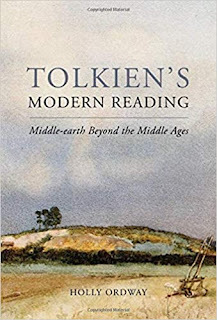 Tolkien: Not just for medieval scholars, anymore.Given that Tolkien was not the first to write secondary-world fantasies for adult readers, nor the first to popularize traditional stories for modern audiences, we should ask what it was that made The Lord of the Rings so startling. Part of the answer, at least, is that Tolkien, like a scribe of the kingdom, brought out from his storehouse treasures both old and new.
Tolkien: Not just for medieval scholars, anymore.Given that Tolkien was not the first to write secondary-world fantasies for adult readers, nor the first to popularize traditional stories for modern audiences, we should ask what it was that made The Lord of the Rings so startling. Part of the answer, at least, is that Tolkien, like a scribe of the kingdom, brought out from his storehouse treasures both old and new.
--Holly Ordway, Tolkien’s Modern Reading
J.R.R Tolkien has been described as harder to influence than a Bandersnatch, and commonly believed to be utterly uninterested in any literature written after the Canterbury Tales. As it turns out, these claims are largely untrue. Tolkien was indeed an ardent medievalist, but the “leaf mould” of his imagination was far deeper, and richer, and broader, than just an amalgamation of ancient works. The person to blame for this inaccurate characterization? The late Humphrey Carpenter, author of the only authorized biography of Tolkien and the only outsider (still!) ever permitted complete access to Tolkien’s complete letters.
We now have Holly Ordway to thank for setting the record straight with Tolkien’s Modern Reading: Middle-Earth Beyond the Middle Ages (Word on Fire, 2021). This is one of the better works of Tolkien criticism I have read. Nothing can (or likely ever will compare to) Tom Shippey’s The Road to Middle-Earth, and I’ve also got a great respect and admiration for John Garth’s Tolkien and the Great War, but Ordway’s book is both highly readable and illuminating, which is what I look for in literary criticism.
Ordway’s book studies fiction that Tolkien would have considered “modern” (published 1850 to his present day) and that had some influence, glancing or readily apparent, on his main legendarium (The Hobbit, The Lord of the Rings, The Silmarillion). Ordway restricted her work only to those authors whom Tolkien definitely interacted with, as can be traced to notations or references in his public writings, letters, interviews, from reports from other people, or in his work in academia. Ordway’s work lists a total of 148 authors and more than 200 titles. These include the likes of a few authors that should be familiar to readers of this blog: Poul Anderson, Algernon Blackwood, Ray Bradbury, Edgar Rice Burroughs, James Branch Cabell, Lord Dunsany, E.R. Eddison, H. Rider Haggard, Robert E. Howard, Henry Kuttner, Andrew Lang, Fritz Leiber, C.S. Lewis, H.P. Lovecraft, George MacDonald, C.L. Moore, William Morris, Clark Ashton Smith, Robert Louis Stevenson, and T.H. White, among many others. Many of these seem to have had negligible influence (Tolkien read the likes of Howard and Smith for example in the L. Sprague de Camp collection Sword & Sorcery, and has little to say about it), but other authors made an impact, sometimes profound.
Not all of Tolkien’s reading was fantastic: One of the books that apparently inspired him greatly was J.H. Shorthouse’s John Inglesant, widely read in Tolkien’s day though largely forgotten today. Ordway does a fine job tracing these influences and matching them up, thematically or stylistically, with passages from Tolkien’s texts. For example, from MacDonald’s Lilith he may have drawn inspiration for his themes of death and deathlessness (MacDonald was father to 11 children, but was predeceased by six of them, including his eldest child Lilia). Both MacDonald and Tolkien were “men much acquainted with grief.” Tolkien also credits MacDonald’s goblins as a direct inspiration for his own underground dwellers in The Hobbit. MacDonald looms large enough to get his own chapter, as does, unsurprisingly, William Morris, whose Goths from The House of the Wolfings are stamped all over the Rohirrim. Interestingly, Ordway makes a good case that Morris’ imperialistic, militarized Romans may have inspired Tolkien’s orcs.
Haggard might be a surprise to some: Tolkien read so voraciously of old HRH him that Ordway devoted a whole chapter to his influence (“Rider Haggard: Fresh Ore from Old Mines”). We know that the eponymous She of Haggard’s famous ovel was an influence on Galadriel, and that he loved King Solomon’s Mines, but Ordway also reveals that Tolkien read the likes of the lesser-known The Wanderer’s Necklace. As late as 1961 he was still reacting positively in interviews to the name of Haggard. Dunsany was like Tolkien a veteran and wrote the preface of Tales of Wonder while recovering from a War Wound, just as Tolkien began writing of his legendarium while recovering from trench-fever. Ordway also includes some deep cuts, noting that Tolkien borrowed elements of a pitched wolf battle in the pines from S.R. Crockett’s The Black Douglas (1889) for Bilbo’s escape from the wargs in The Hobbit. The striking art from this book bears it out.
There is much, much more to recommend from this book, including coverage of writers such as Matthew Arnold, Sinclair Lewis, even a handful of science-fiction authors like H.G. Wells (Tolkien read them, too). If you’re a Tolkien fan, seek it out and read it.
January 16, 2022
Latest Rogues in the House podcast is up: Deathstalker 2, and Flame and Crimson too
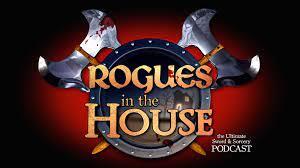 The Ultimate Sword-and-Sorcery podcastThe latest episode of the Rogues in the House podcast is now available for your listening enjoyment. The cast and crew of Rogues were kind enough to ask me on the show, and I have to say I had a BLAST. I mean, I spent last Thursday evening drinking a couple beers and talking sword-and-sorcery, Deathstalker 2, and the zaniness of the 1980s in general.
The Ultimate Sword-and-Sorcery podcastThe latest episode of the Rogues in the House podcast is now available for your listening enjoyment. The cast and crew of Rogues were kind enough to ask me on the show, and I have to say I had a BLAST. I mean, I spent last Thursday evening drinking a couple beers and talking sword-and-sorcery, Deathstalker 2, and the zaniness of the 1980s in general. We had way more fun than we had any right to, but if you can't laugh watching Deathstalker 2 you were obviously born without a sense of humor.
Check out the episode here. We also talked Flame and Crimson quite a bit as well.
January 13, 2022
Rogues in the House: Deathstalker 2!
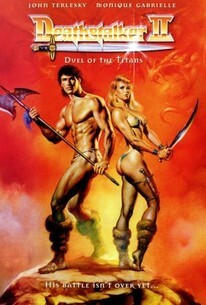 You won't find this level of beefcake ...Any fans of this fun podcast, the only program wholly dedicated to sword-and-sorcery? I’m one of them, and tonight I get the pleasure of guesting on an episode.
You won't find this level of beefcake ...Any fans of this fun podcast, the only program wholly dedicated to sword-and-sorcery? I’m one of them, and tonight I get the pleasure of guesting on an episode.
The topic? Deathstalker 2: Duel of the Titans.
Somehow I had never watched Deathstalker 2. I look back upon my many years of renting the most exploitative videos I and my high school buddies could find, idle time spent scrolling YouTube, the additional (painful) video research I conducted for Flame and Crimson, and I wonder how this one eluded me. The only explanation I can come up with is that Deathstalker 1 is so outrageously awful, near irredeemable, that I wanted no further part of the series.
In addition, I’ve consciously avoided the S&S films of the 80s. It got too depressing to see a subgenre that gave us Fafhrd and the Gray Mouser, The Dying Earth, Conan and Kull, Elric, etc. handled so badly on the silver screen.
But, in recent years I’ve made peace with sword-and-sorcery films. I view them now as a cornball corner of pop culture history to enjoy as guilty pleasures. And, I’m already glad I got the opportunity to guest on Rogues because Deathstalker 2 is fun. Sword-and-sorcery fans will find their subgenre treated with about as much subtlety and reverence as Animal House did for undergraduate education. I would describe it as objectively a bad film, but subjectively awesome. It knows what it is, and while not a true parody like Men in Tights for example it is entirely a tongue-in-cheek take on S&S.
Make no mistake, this is by any measure a bad movie. Really bad. The acting is below the level of a soap opera, the plot barely a thread, the script full of holes, and the sets and props are cheap and flimsy and entirely recycled. It lacks proof of having been backed by anything resembling a budget; in fact, there really wasn’t one. If there was, it was spent by the cast and crew in Argentinian dive bars. Nevertheless, I enjoyed the hell out of it. It’s a poor man’s Army of Darkness.
You can currently find Deathstalker 1 and 2 on Tubi, a free movie service. My advice: Skip the first and head straight to the sequel. And look for our insights and analysis of this fine film on an upcoming episode of Rogues in the House.
January 8, 2022
Starting 2022 with Michael Moorcock���s The Swords Trilogy
My latest post, and first of the year for DMR Books in 2022, is now up: Starting 2022 with Michael Moorcock���s The Swords Trilogy.
I love The Book of Swords and think the Corum stories are perhaps on a par quality-wise with Elric. If you haven't read them do yourself a favor and get to it. And while you're at it, be thankful we still have Mr. Moorcock on the planet. I sent him an email a while back and he was kind enough to respond. 82 years old and 60 years of S&S is a pretty good run, and I suspect we'll see a few more stories from his pen.
This line made me sit up when I read it: ���The nearest we ever come to knowing truth is when we are witnesses to a paradox.��� Tanelorn, the city of equilibrium at the center of so many of Moorcock's stories and a refuge sought after by his Eternal Champions, is one such example. How can such a place exist; how can such a state exist in the heart of a species so divided and unreasoning and passionate as our own? How can fate and free will exist simultaneously and serve to explain our ultimate fate?
The answer is, they can. We are all Mabden, and Vadhagh, simultaneously.
Also, a castle made of blood? Yeah, it's in there too.
Starting 2022 with Michael Moorcock’s The Swords Trilogy
My latest post, and first of the year for DMR Books in 2022, is now up: Starting 2022 with Michael Moorcock’s The Swords Trilogy.
I love The Book of Swords and think the Corum stories are perhaps on a par quality-wise with Elric. If you haven't read them do yourself a favor and get to it. And while you're at it, be thankful we still have Mr. Moorcock on the planet. I sent him an email a while back and he was kind enough to respond. 82 years old and 60 years of S&S is a pretty good run, and I suspect we'll see a few more stories from his pen.
This line made me sit up when I read it: “The nearest we ever come to knowing truth is when we are witnesses to a paradox.” Tanelorn, the city of equilibrium at the center of so many of Moorcock's stories and a refuge sought after by his Eternal Champions, is one such example. How can such a place exist; how can such a state exist in the heart of a species so divided and unreasoning and passionate as our own? How can fate and free will exist simultaneously and serve to explain our ultimate fate?
The answer is, they can. We are all Mabden, and Vadhagh, simultaneously.
Also, a castle made of blood? Yeah, it's in there too.
January 5, 2022
I, Black Sabbath (with incredible Conan imagery)
Metal Friday has come early this week because I just can't resist sharing this awesome video for Black Sabbath's "I," with the late, great Ronnie James Dio supplying the lyrics. This one is off the little regarded Dehumanizer (1992).
I don't know how much time went into the creation of this video, but Crom, is it awesome. A flood of great, classic Conan comics images, perfectly matched with the lyrical content and timed to the music. Well done, anonymous internet dude.
This might be the most sword-and-sorcery video I've encountered. Check it out, and be prepared to headbang, or behead someone with an axe.



